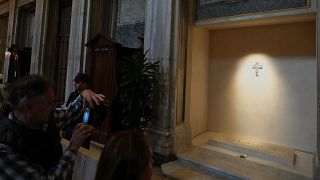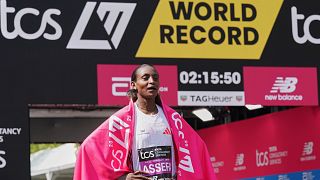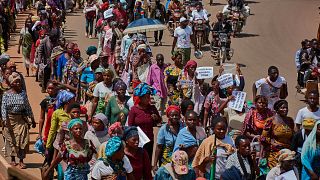Presidential elections
In Wanindara, a predominantly Fulani suburb of Guinea's capital Conakry, few say they will vote for Alpha Conde, the 82-year-old bidding for a controversial third presidential term on Sunday.
But despite the West African state's ethnic cleavages - which come to the fore during election season - few in Wanindara say that group allegiance determines their vote.
Sitting in a kiosk in the dusty suburb, 24-year-old SIM card vendor Abdourahmane Bah says he will vote for opposition candidate Cellou Dalein Diallo.
"We will not vote for him because he is Fulani and the majority of Wanindara is Fulani, but because we want someone who reconciles the people of Guinea," he said.
The suburb, among other areas of the former French colony, has been the scene of violent clashes between protesters and security forces for months over opposition to a third term for Conde.
In March, the president pushed through a revamped constitution that he said would modernise the country, but which has also allowed him to bypass the two-term presidential limit.
Diallo, his main challenger in Sunday's vote, is an ethnic Fulani who was instrumental in organising opposition to Conde's third term, and who retains strong support in Wanindara.
Conde's RPG party is largely backed by the Malinke people, and Diallo's UFDG by Fulani, although both insist that they are pluralist.
But Vincent Foucher, a researcher at the Paris-based French National Centre for Scientific Research, said ethnic allegiance only partly explains political affiliations in Guinea.
Both candidates scored at least 75 percent in their respective ethnic strongholds in the last presidential election, he said.
But since no single community can command an outright majority, candidates tend to rein in ethnic chauvinism, Foucher added.
"All the more serious candidates take care to ally themselves with politicians or representatives from other communities," he said.
Exact figures are hard to come by, but the Fulani and the Malinke ethnic groups are believed to together make up the majority of the nation's 13 million people. The Soussou are another major ethnic group.
Not polarised
Wanindara, and other Fulani-dominated settlements surrounding Conakry's Route Le Prince, a major artery, saw some of the most violent mass protests against a third term for Conde.
Route Le Prince is lined with small shops and food joints, where meals are mostly cooked in smoking pots by the roadside.
Anti-Conde demonstrations in the area beginning late last year were met with a ruthless crackdown, which left dozens of people dead.
Souleymane Barry, 40, who runs a small shop on Route Le Prince, says security forces targeted the area because of anti-Fulani sentiment.
He is adamant that ethnic relations are otherwise harmonious, however, noting that Malinke people frequent his shop.
"There is no problem between Fulani and Malinke," he said, adding that the government was trying to drive a wedge between them.
The government denies this, and Security Minister Albert Damantang Camara also told AFP that security forces do not use excessive force, insisting that they must maintain order for everyone's benefit.
Foucher, the researcher, said Guinean society is generally not polarised but that the electoral climate encourages abuses.
'Pan-Africanist'
A former opposition activist, Conde became Guinea's first democratically elected president in 2010, and won re-election five years later.
Rights groups are increasingly critical of him, however, and he has drawn fire for apparently appealing to his ethnic base on the campaign trail.
Conde normally speaks French when addressing the nation, but last month, in a speech delivered in the Malinke language, he told voters that backing an opposition Malinke candidate amounted to voting for Diallo.
Against a backdrop of concerns about ethnicity, representatives from the United Nations and African Union warned against "ethnic hate speech" in Guinea this month.
Conde firmly denies exploiting ethnicity, however.
"I have never made ethnic speeches for the simple reason that I am a pan-Africanist," he told French broadcasters this month.
Conde added that during his long years as an opposition activist, he often worked alongside Fulani people, and that his command of the Malinke language is subpar despite his ethnic background.
"I am Malinke (but) I speak Soussou ten times better than Malinke," he said.











01:15
Gabon’s constitutional court confirms Nguema’s landslide presidential victory
01:02
Former Guinean junta leader Moussa Dadis Camara leaves country for medical reasons
Go to video
Gabonese react to Brice Oligui Nguema's landslide presidential election election
01:58
Namibia swears in first female president
03:15
Namibia: Supreme Court throws out challenge to presidential election result
01:26
Ivory Coast: Laurent Gbagbo's party contests the conviction of its officials